- Home
- China
- World
- Europe
- Politics
- Business
- Opinions
- Tech & Sci
- Culture
- Sports
- Travel
- Nature
- Picture
- Video
- Live
- TV
- Specials
By continuing to browse our site you agree to our use of cookies, revised Privacy Policy and Terms of Use. You can change your cookie settings through your browser.
SUMMARY
The Chinese Foreign Ministry on Monday confirmed the U.S. Consulate General in Chengdu, capital city of the southwestern province of Sichuan, was closed at 10:00 a.m. BJT. Chinese authorities have entered the building and taken over the now-closed consulate.
China's Foreign Ministry spokesperson Wang Wenbin said on Monday that China's request to close U.S. consulate in Chengdu is a legitimate and necessary response to U.S. closure of China's Houston consulate and forced entry of American officials into the premises.
China informed the U.S. Embassy in China on July 24 of its decision to withdraw its consent for the establishment and operation of the U.S. Consulate General in Chengdu after the U.S. abruptly demanded China close its consulate general in Houston on July 21.
Here is what we know so far:
- Chinese State Councilor and Foreign Minister Wang Yi said the U.S. is entirely to blame for current difficulties in bilateral relations.
- Chinese Consul General of Houston Cai Wei said in an open letter that the friendship between the Chinese and American people will prevail, despite the deliberate escalation of tensions by a few U.S. politicians.
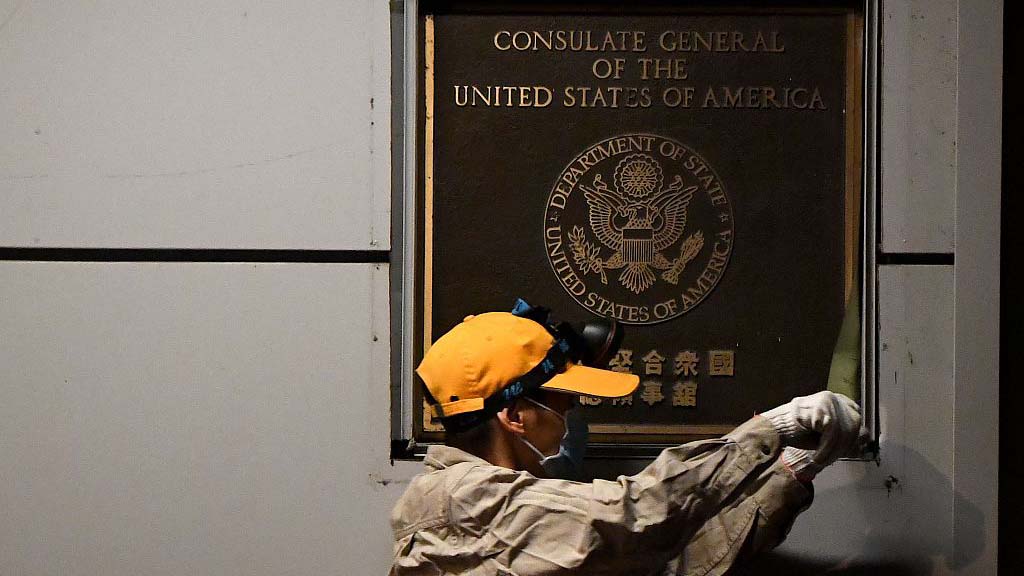
The local U.S. consulate has been closed in Chengdu. Chinese authorities entered through the front gate and took over the premises. The closure was in response to Washington's move to shut down the Chinese consulate in Houston.
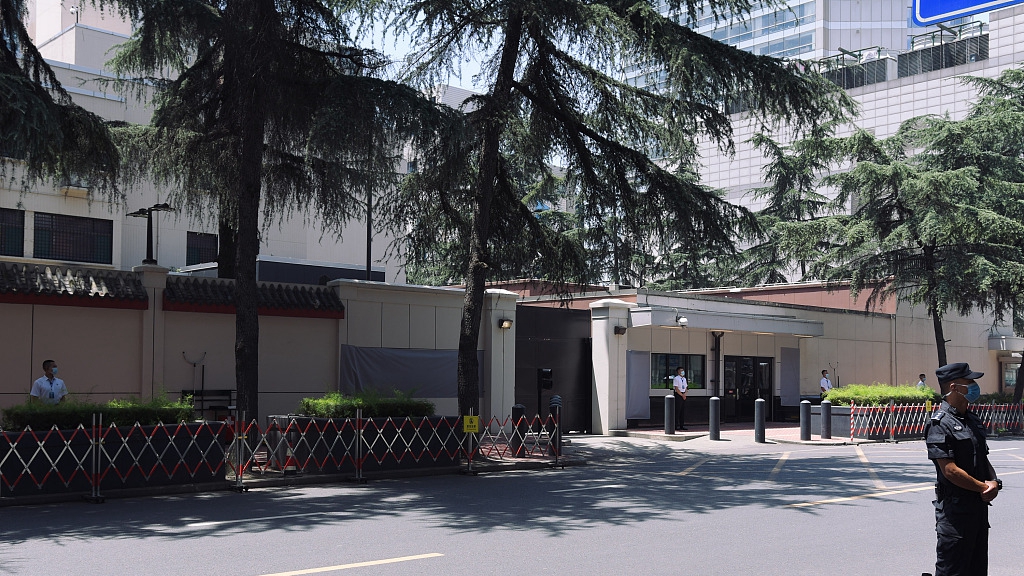
The U.S. Consulate General in Chengdu, China, July 27, 2020 /VCG
FM spokesperson: China's takeover of U.S. Chengdu consulate conforms with int'l law, basic norms of int'l relations
China's Foreign Ministry spokesperson Wang Wenbin said on Monday that China's request to close U.S. consulate in Chengdu is a legitimate and necessary response to U.S. closure of China's Houston consulate and forced entry of American officials into the premises.
The takeover of the premises conforms with international law and basic norms of international relations, noted Wang.
The current situation in China-U.S. relations is not what we desire to see, and the U.S. is responsible for all this, said Wang, once again urging the U.S. side to immediately correct its mistakes and create necessary conditions for bringing the bilateral relationship back on track.
Click here for more.
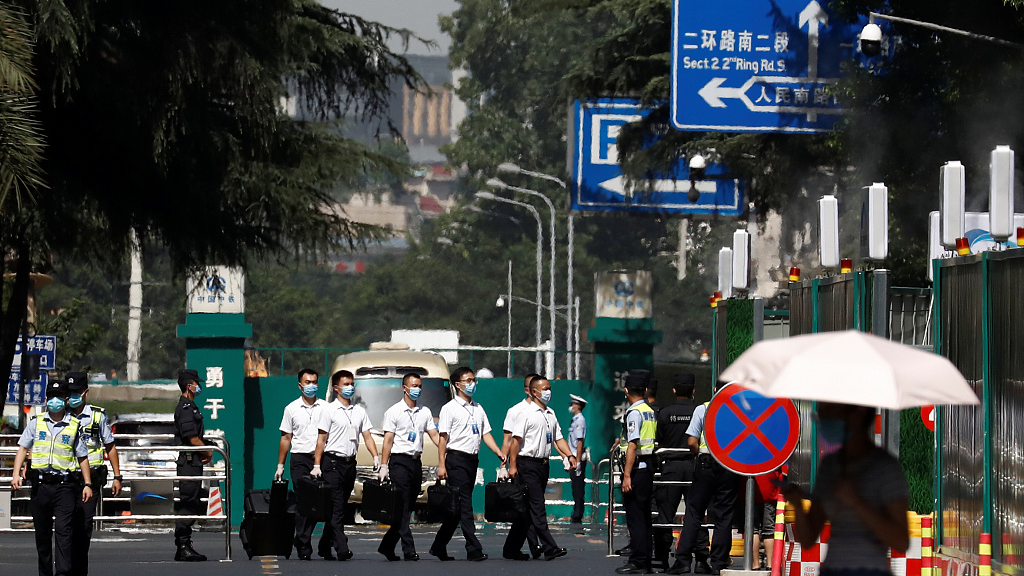
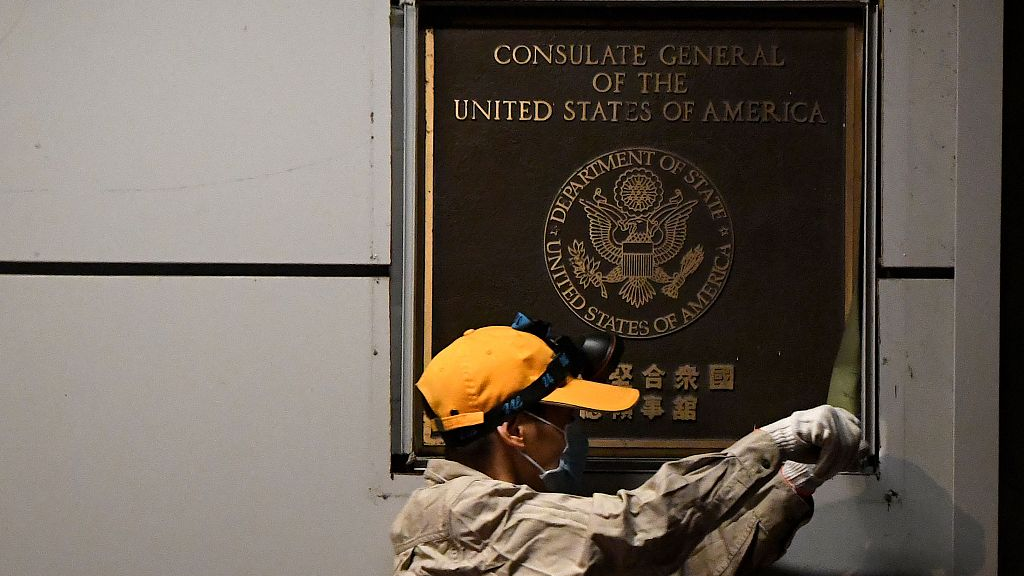
At the scene: Chinese authorities take over closed U.S. Chengdu consulate
As required by China, the U.S. Consulate General in Chengdu closed at 10 a.m. on Monday. The relevant Chinese authorities then entered through the front entrance and took over the premises.
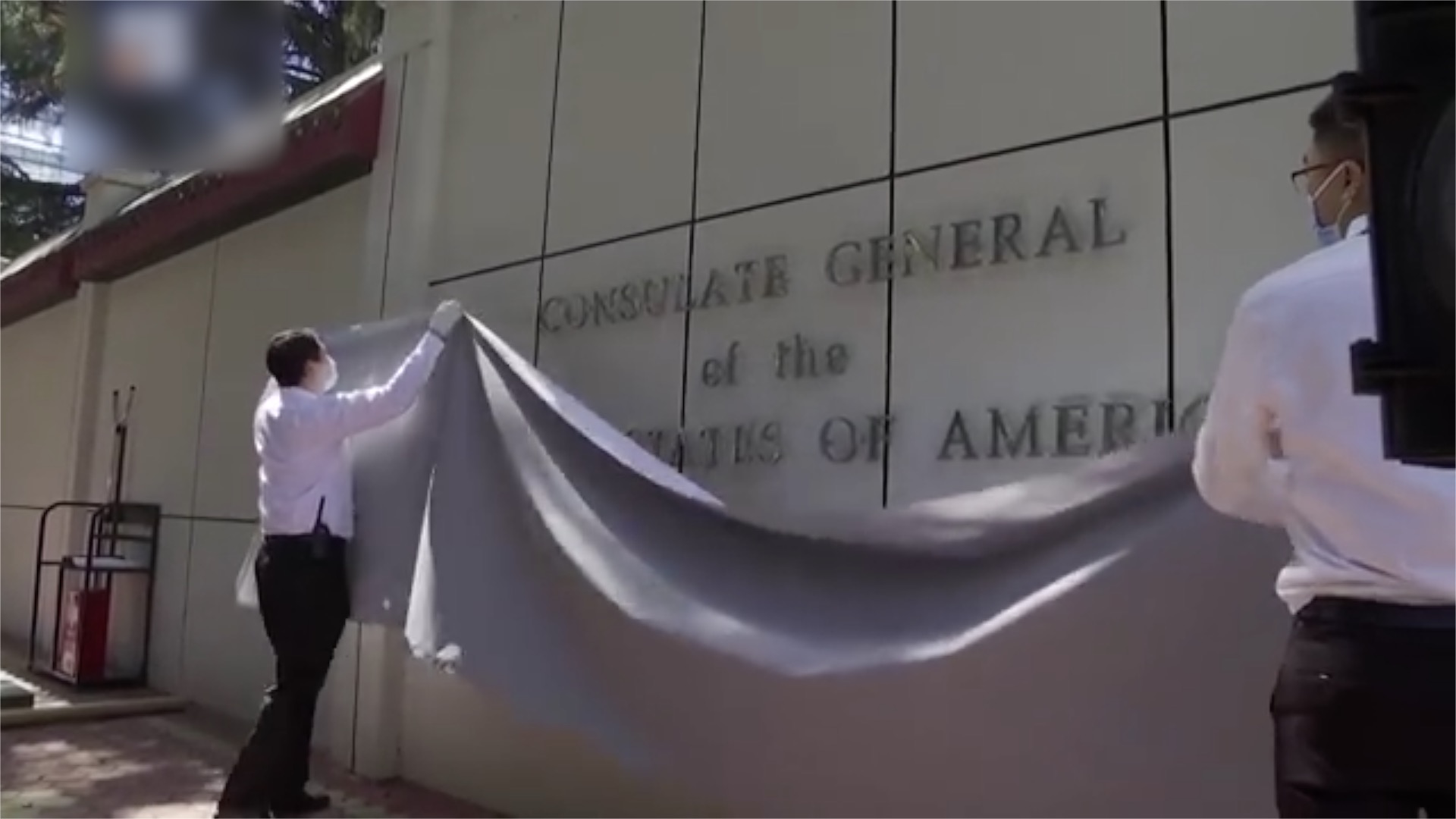
U.S. Consulate General in Chengdu closed: China's Foreign Ministry
The Chinese Foreign Ministry on Monday confirmed that the U.S. Consulate General in Chengdu, capital of the southwestern province of Sichuan, closed at 10:00 a.m. BJT.
"At 10: 00 a.m. on July 27th, according to the Chinese side's request, the U.S. Consulate General in Chengdu was closed. Afterwards, Chinese authorities entered through the front entrance and took it over," the ministry said in a statement on its official social media account.
Timeline: U.S. vacates Chengdu consulate in 72 hours
China on Friday ordered the U.S. to close its consulate general in Chengdu in 72 hours in retaliation to the U.S. demand for China to shutter its consulate general in Houston.
Here is what happened during the 72 hours as the U.S. vacated the premises.
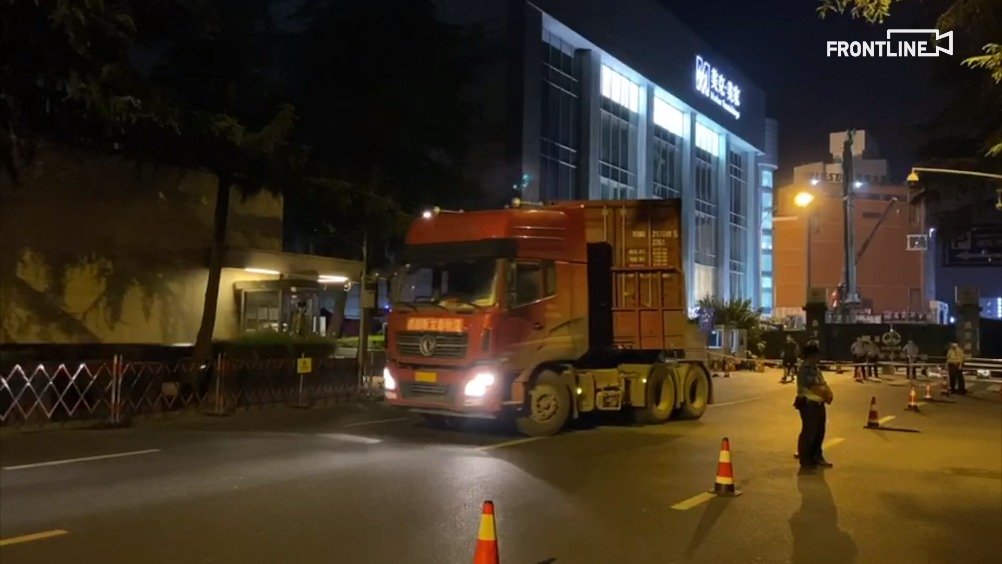
Staffers spotted leaving U.S. consulate general in Chengdu
A group of staffers at the U.S. Consulate General in Chengdu were spotted leaving the consulate general at around 6:00 a.m. before a U.S. national flag was lowered at around 6:18 a.m. on Monday.
China had ordered the U.S. to close its consulate in Chengdu in 72 hours in retaliation to the U.S. demand for China to shutter its consulate in Houston.
The deadline for the U.S. consulate's evacuation was reportedly 10:00 a.m. Monday.
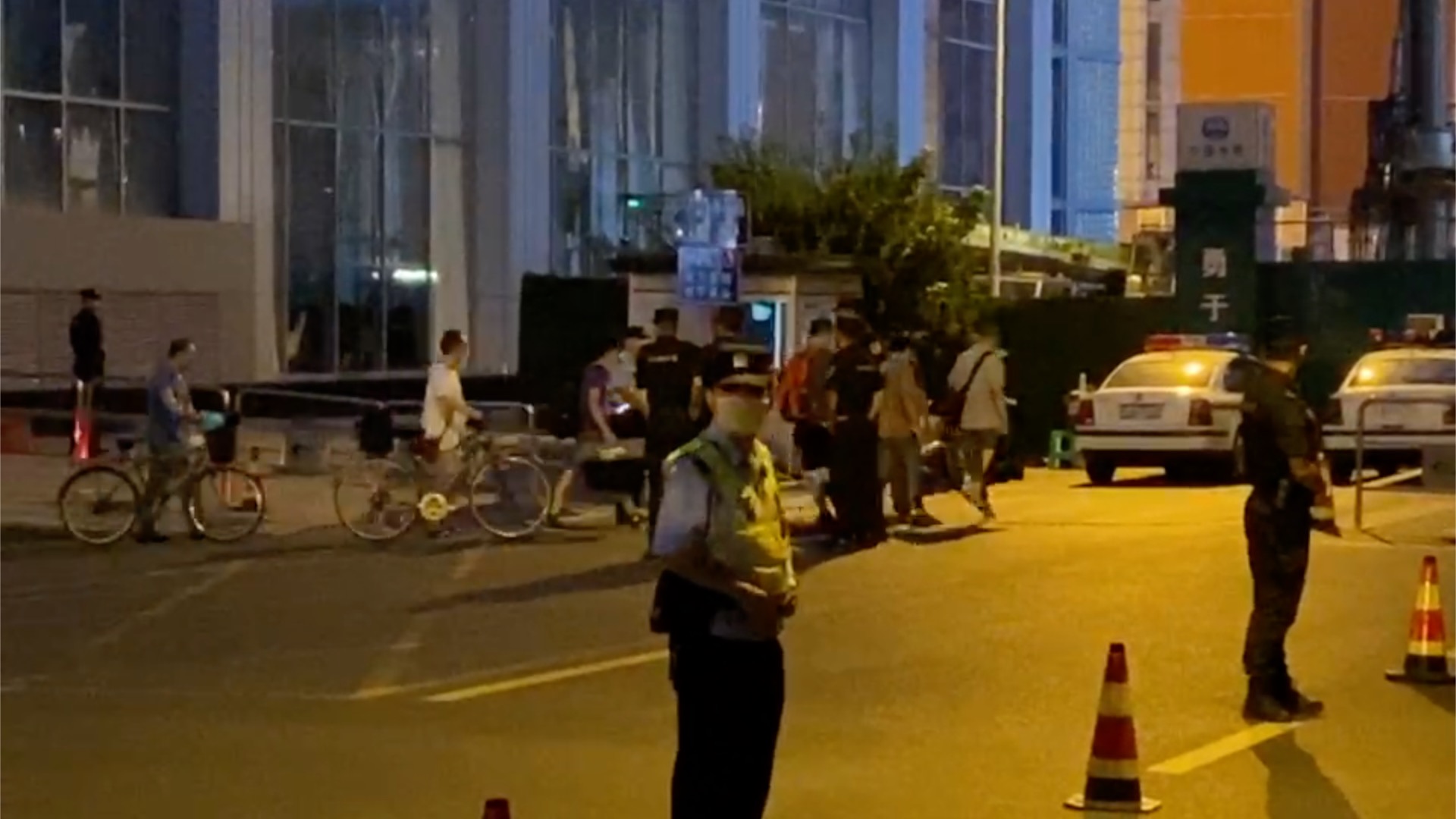
U.S. national flag lowered in Chengdu consulate
A U.S. national flag has been lowered at the U.S. Consulate General in Chengdu at around 6:18 a.m. on Monday.
China ordered the U.S. to close its consulate in Chengdu in response to the U.S. demand for China to shutter its consulate in Houston. The deadline for evacuation is reported to be Monday morning.
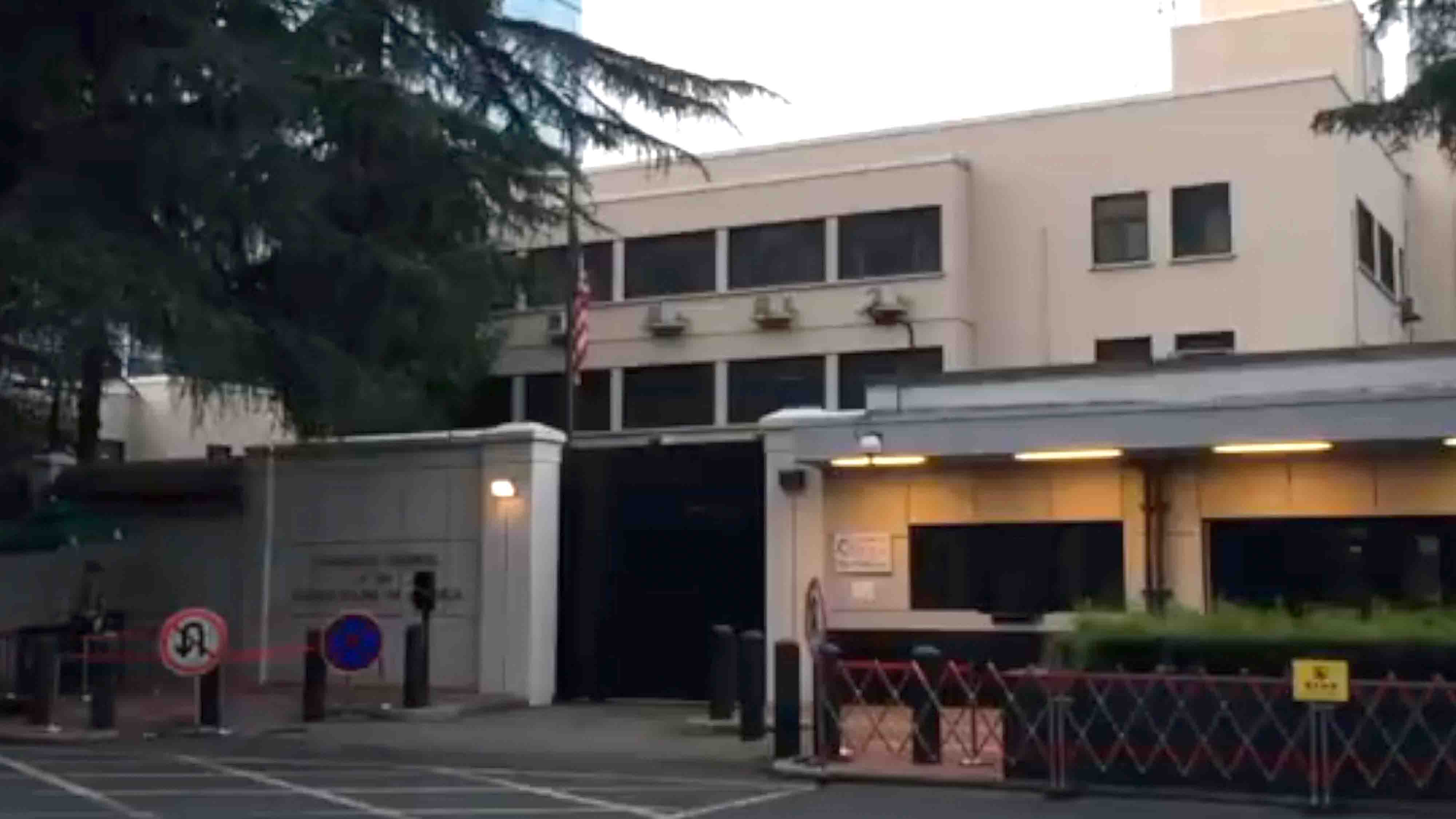
Timeline of events at the U.S. consulate in Chengdu
Here is a recap of the events surrounding the closure of the U.S. consulate in Chengdu:
On Friday, China ordered the U.S. to close its consulate in Chengdu in response to the U.S. demand for China to shutter its consulate in Houston. The deadline for evacuation is reported to be Monday morning.
Later in the afternoon, locals set off firecrackers in front of the consulate.
On Saturday, staff began carrying boxes in and out of the consulate. Removal trucks were also spotted.
Later on, workers removed the U.S. insignia from the building and the trucks departed the consulate.
On Sunday, the moving process continued, as a removal truck and some workers entered the consulate. Later, a coach left the site.
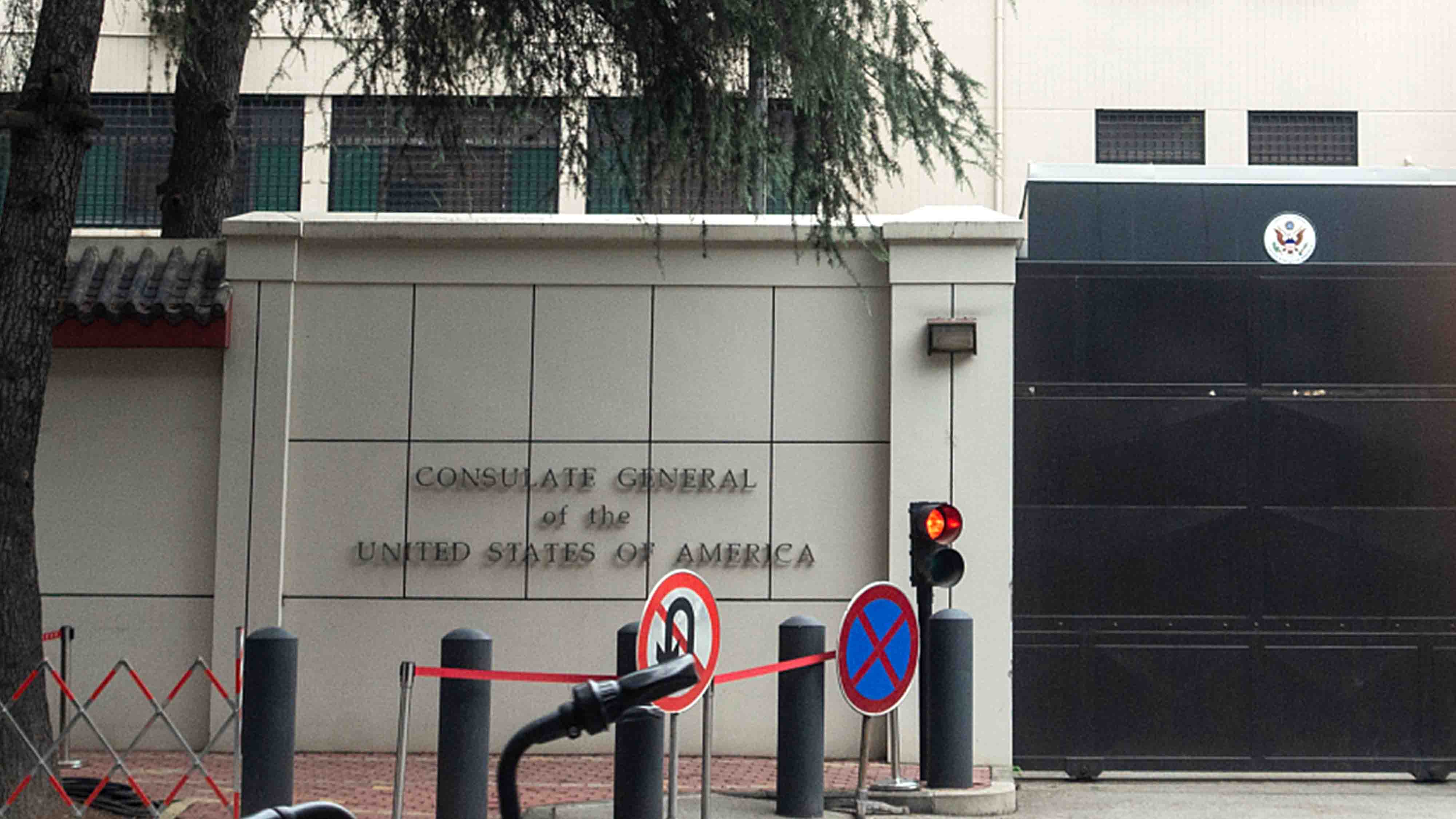
A worker was seen removing the plaque of the U.S. Consulate General in Chengdu on Sunday evening.
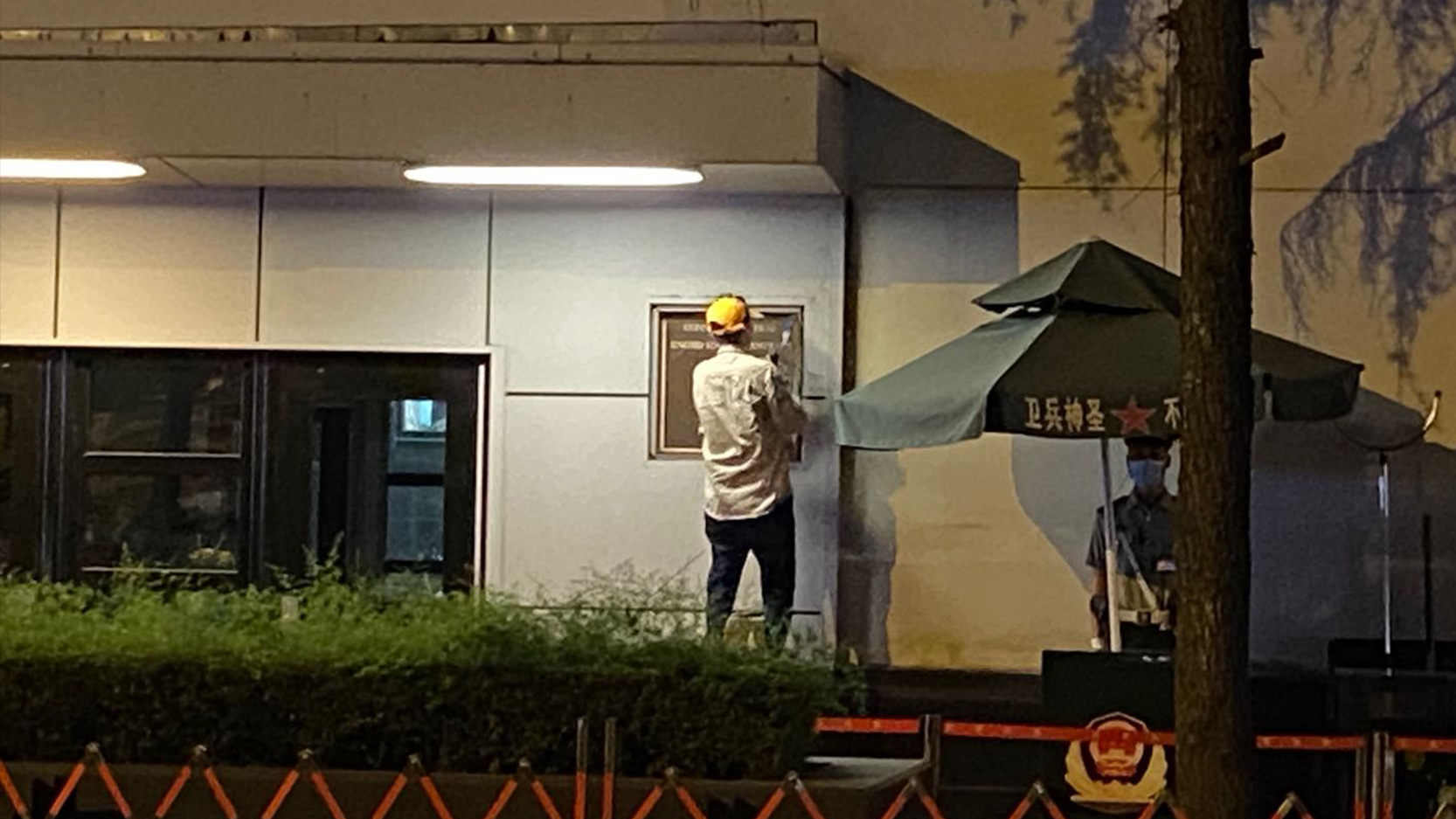
Car enters U.S. consulate in Chengdu as deadline looms
A white vehicle with diplomatic license plate drove into the U.S. Consulate General in Chengdu at 5:56 p.m. on Sunday. The staff have less than 24 hours to vacate the premises.
The development comes after Washington ordered the closure of the Chinese Consulate-General in Houston earlier this week.
The Chinese Foreign Ministry didn't make public the deadline for the departure of the mission's personnel, but it's expected to be tomorrow morning.
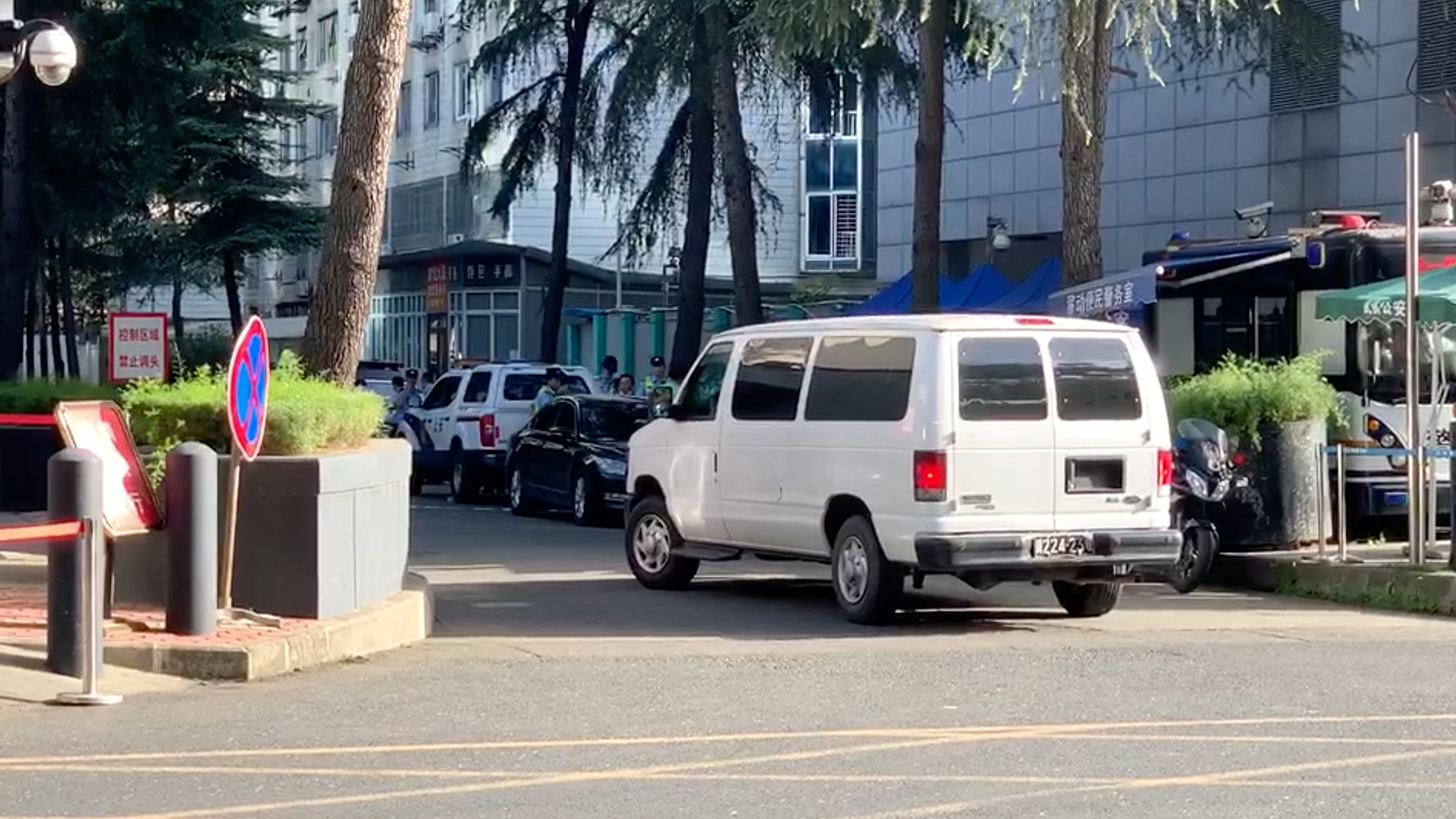
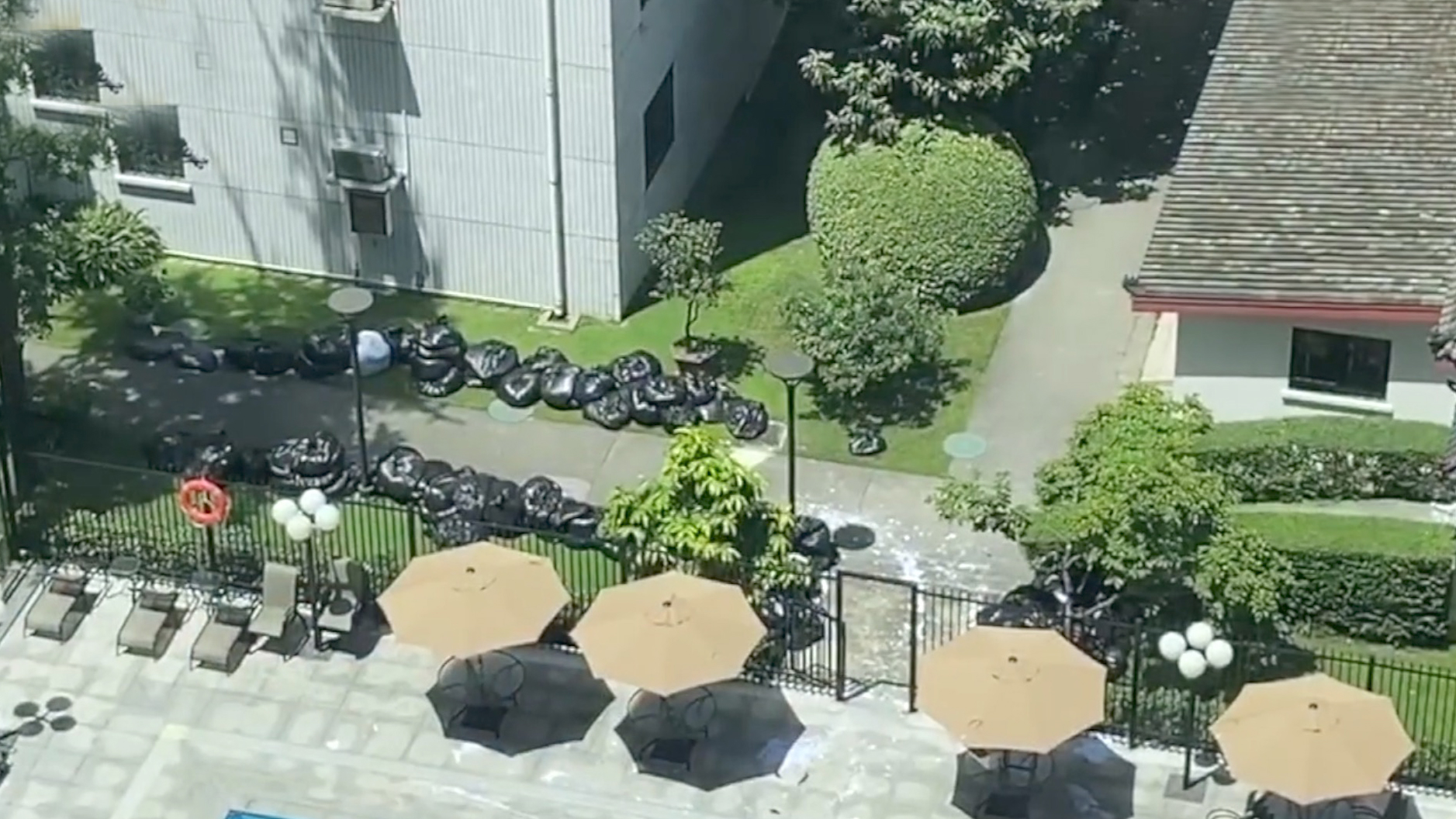
The video shows garbage bags lined up at the U.S. Consulate General in Chengdu. Per reports, a large number of black garbage bags have been transported out of the consulate over the last few days.
No different from burglary: Hua Chunying slams U.S. for breaking into Houston consulate
China's Foreign Ministry spokesperson Hua Chunying on Sunday lashed out at the U.S. for forcibly entering the Chinese Consulate-General in Houston, expressing strong dissatisfaction and firm opposition to the move.
"The premises of China's Consulate General in Houston are the Chinese government's property. The U.S.' break-in is violation of the Vienna Convention Consular Relations as well as the U.S. Constitution and the Foreign Missions Act," Hua wrote on Twitter.
"It is no different from burglary," she wrote with a photo showing federal officials and a locksmith pulling on a door to enter the vacated consulate general building.
On Tuesday, the U.S. abruptly ordered China to close its consulate in Houston, Texas, within 72 hours. Shortly after the closure order took effect on Friday, a group of men, reported to be American officials, were seen entering through a door at the consulate. Two uniformed members of the U.S. State Department's Bureau of Diplomatic Security were also at the scene, reported Reuters.
Click here for more.
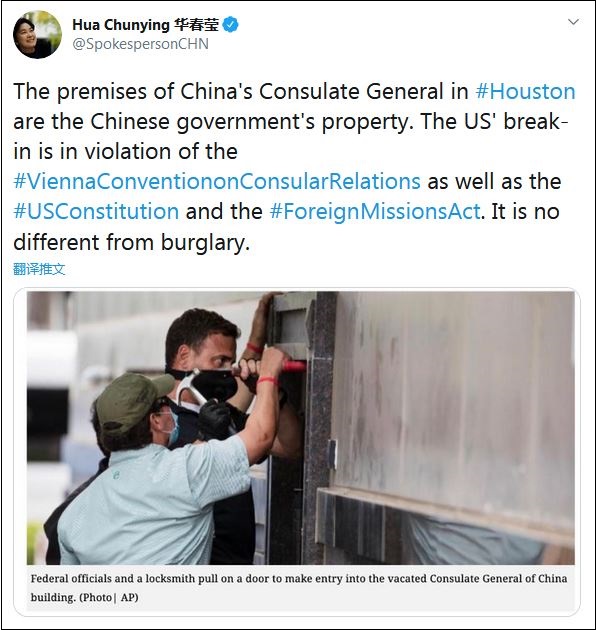
Three medium-sized moving trucks entered the U.S. Consulate General in Chengdu at about 12:20 p.m. on Sunday.
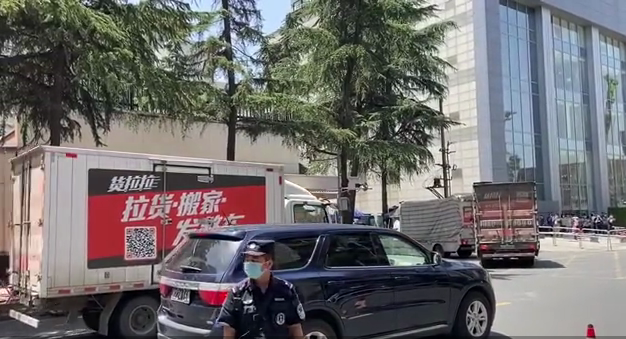
CGTN
In the past 24 hours, signs of closure have been observed at the consulate, reported CGTN's Yang Jinghao earlier on Sunday.
The street remains closed to traffic and some police officers have been deployed at the scene to maintain the order.
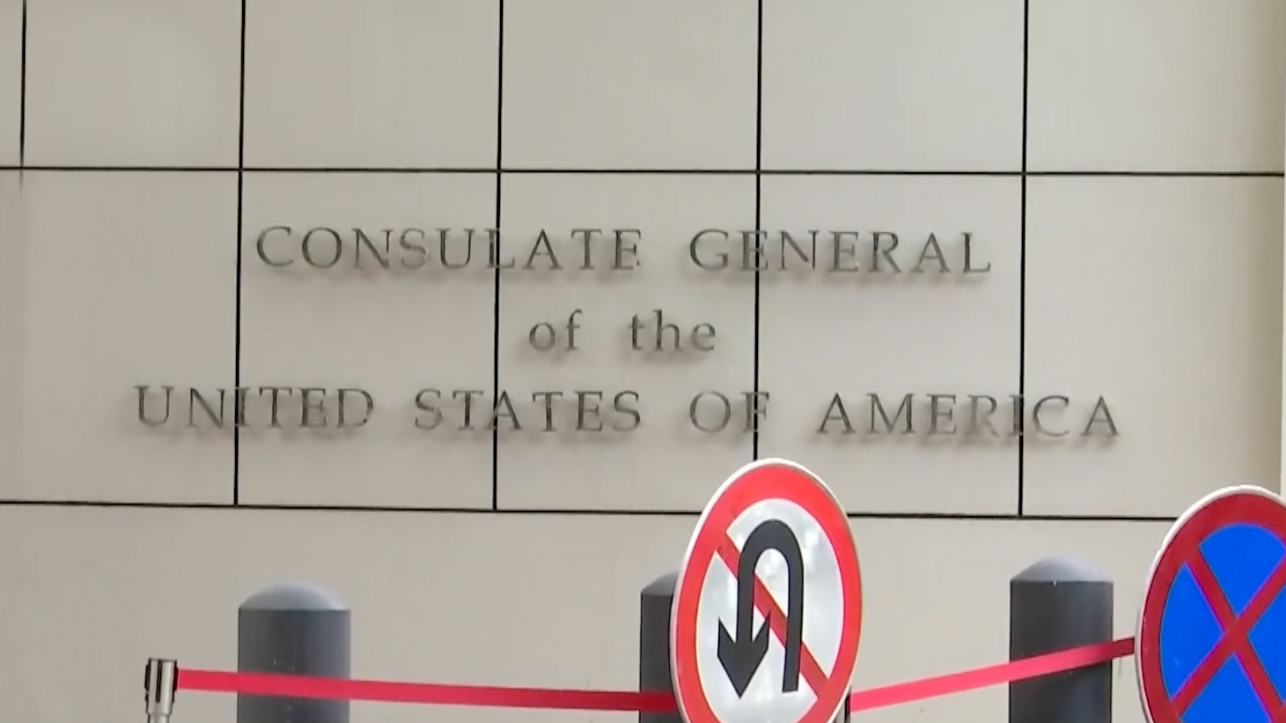
A bus pulls out of U.S. Consulate General in Chengdu
At 9:45 a.m. Beijing Time on Sunday, a bus pulled out of the U.S. Consulate General in Chengdu, according to a CGTN reporter.
It was hard to determine how many people were on board, the reporter said, adding that the bus arrived at the consulate on Saturday afternoon.
The Chinese Foreign Ministry on July 24 informed the U.S. Embassy in China of its decision to withdraw its consent for the establishment and operation of the U.S. Consulate General in Chengdu.
The ministry also made specific requirements on the ceasing of all operations and events by the consulate general, said the ministry in a statement.
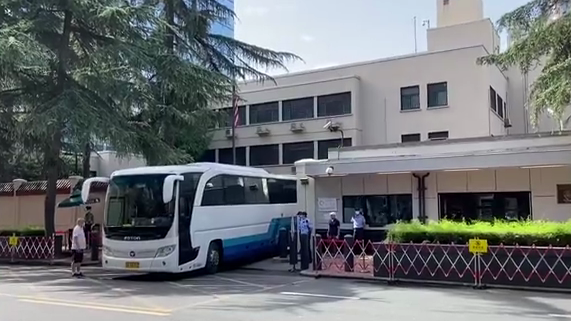

Some U.S. law enforcement officials entered the compound of the Chinese consulate in Houston Friday afternoon. The Chinese Foreign Ministry has made a protest, calling the move a "violation" of the Vienna Convention on the Law of Treaties and the Sino-U.S. Consular Treaty. City University of Hong Kong Law Professor Wang Jiangyu shared his insights on the moves and implications from an international law perspective.
Four Questions: What's next for China-U.S. relations?
Relations between China and the United States hit a nadir this week, with Washington intensifying its attacks by ordering the Chinese consulate in Houston to close and Beijing responding by instructing the U.S. consulate in Chengdu to shut its doors.
Following months of sanctions, counter-sanctions and a diplomatic war of words, Chinese Foreign Minister Wang Yi said bilateral ties are at their lowest point in 40 years. U.S. Secretary of State Mike Pompeo escalated criticism of China in a speech on Thursday, indicating a stabilization of relations is not on the White House's agenda.
As the two sides consider the next steps, CGTN spoke with three experts on four key issues in China-U.S. relations.
Click here for more.
The Chinese Embassy in the United States said on Saturday that it will temporarily take over the work of the Consulate General in Houston, and continue the various services for the people in the consular district.
"Taking into account of the desire and needs of the southern part of the U.S. for continued exchanges and cooperation with China and the practical difficulties that may come up, the Chinese Embassy in the United States will temporarily take over the work of the Consulate General in Houston, and continue the various services for the people in the consular district," the Chinese Embassy said in a statement.
"The Chinese Embassy and Consulates General in the United States have always been committed to the healthy and stable development of China-U.S. relations, to China-U.S. exchanges and cooperation and to the two peoples' friendship," the embassy said.
The statement added that the U.S. closure of China's Consulate General in Houston "has seriously damaged the regular exchanges and cooperation between the people of the southern part of the United States and China and their right for consular services from the Chinese government. It is completely against the people's will."
Read more:
China lodges solemn representations against U.S. forced entry into its consulate: FM spokesperson
FM spokesperson: China lodges solemn representations against U.S. forced entry into its consulate
China expressed strong dissatisfaction and firm opposition, and has lodged solemn representations after the U.S. on July 24 forced its way into the Chinese Consulate General in Houston, said Wang Wenbin, a spokesperson for the Chinese Foreign Ministry, on Saturday.
China will make the proper and necessary response, added Wang.
Click here for more.
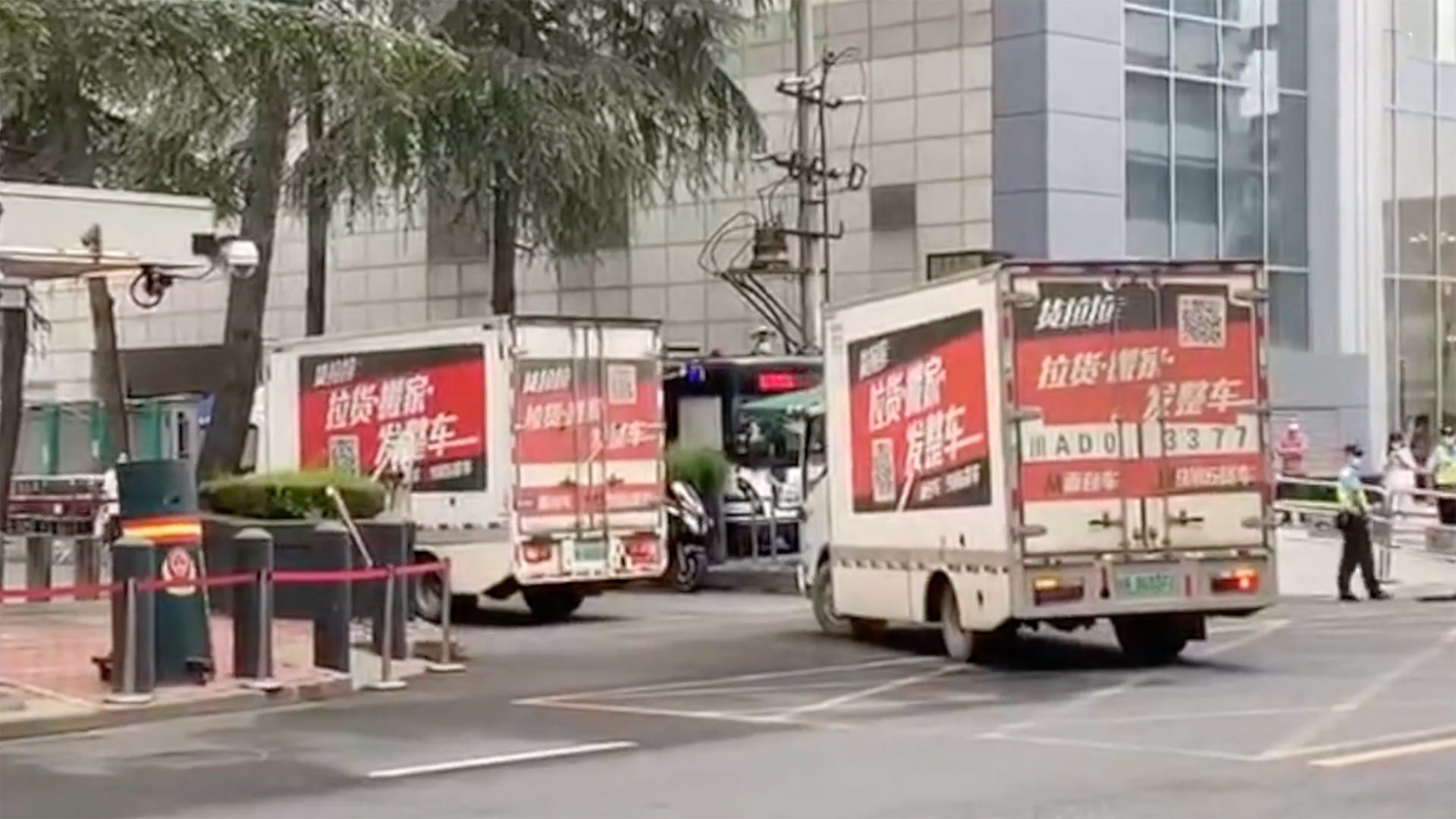
Two vans were seen entering the U.S. consulate general in Chengdu at 2 p.m. on Saturday.
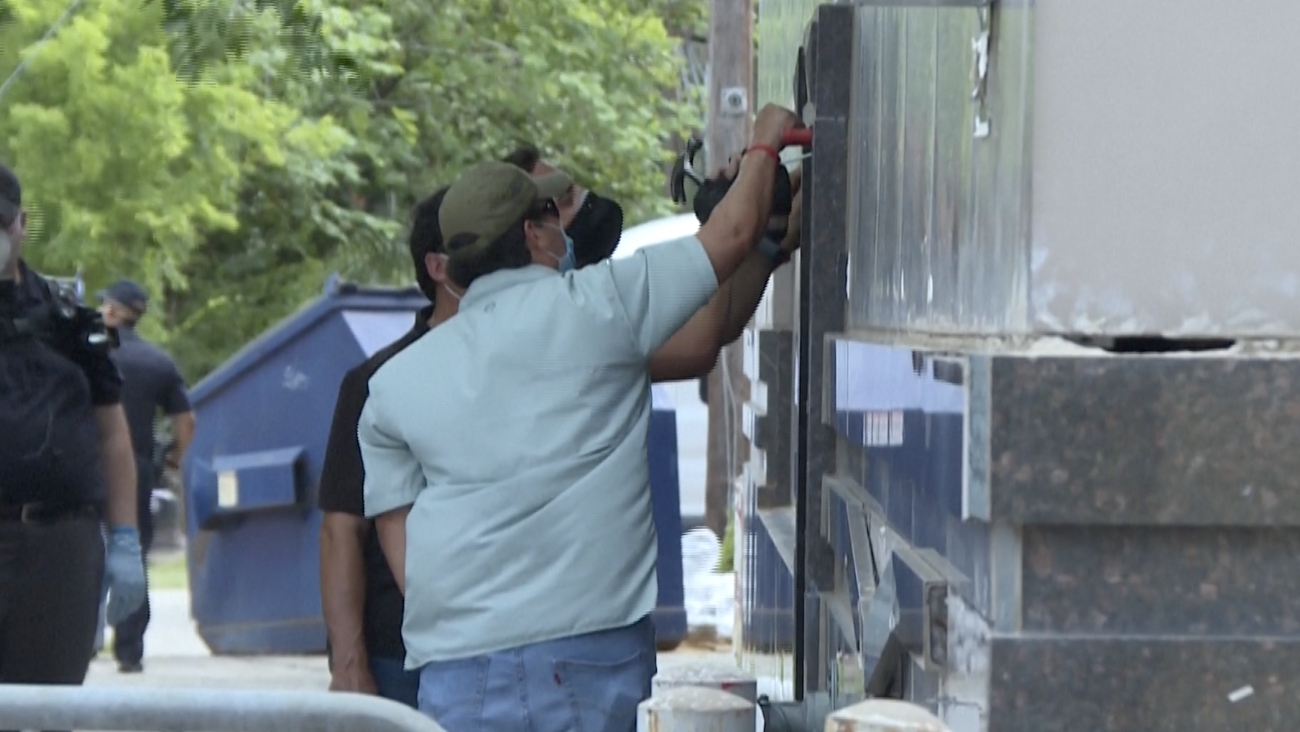
On July 24, law enforcement officers pulled open a back door of the Chinese consulate in Houston and police officers set up barricades near the building on the day of the closure deadline issued by U.S. authorities.
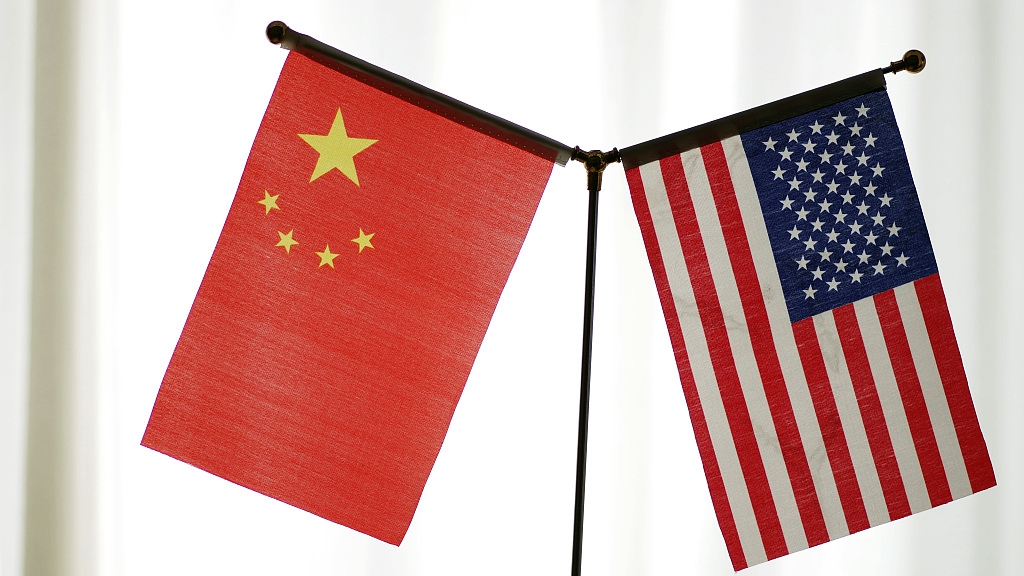
VCG Photo
The Chinese Consul General of Houston Cai Wei said on Friday that the friendship between the Chinese and American people will prevail, despite the deliberate escalation of tensions by a few U.S. politicians.
In an open letter to people in the U.S. southern states, Chinese Consul General of Houston Cai Wei said that the consulate had always stood firmly with the people in the region, particularly in challenges like COVID-19 pandemic and natural disasters like hurricanes.
"I arrived in Houston in early August 2019 to take up my new position. So far, I have visited all 8 states in the consular district," Cai said in his letter.
He recalled his visit to "Flying Tigers" Memorial in Baton Rouge, Louisiana, which he said is a testament of profound friendship formed by the Chinese and American people when they fought against Fascism.
He also recalled he was invited to attend a high-profile celebration event in Georgia during this Chinese New Year, when Chinese and Americans sent best wishes to each other.
"In the future, no matter where I am, I will continue to support the friendly exchanges and cooperation between China and the people in the southern United States," he said in the letter.
He added that both China and the U.S. are great countries, saying that cooperation benefits both and confrontation hurts both.
"The bilateral exchanges between the Chinese government and the southern region of the United States will not stop, and services to overseas Chinese will not stop," Cai stressed.
He said the Chinese embassy in the United States will make proper arrangements for friendly cooperation and consular services.
What happened?
On Tuesday, the U.S. abruptly ordered China to close its consulate in Houston, Texas, within 72 hours. Shortly after the closure order took effect on Friday local time, a group of men, reported to be American officials, were seen entering a door at the consulate. Two uniformed members of the U.S. State Department's Bureau of Diplomatic Security were also at the scene, reported Reuters.

In a response to the U.S. side on consulate closure, China on Friday ordered the U.S. to close its consulate general in southwest China's Chengdu City in response to the U.S. directive for China to shut its consulate general in Houston.
The Chinese Foreign Ministry said that the decision was a justifiable and necessary response to the unreasonable act of the U.S.
Chinese State Councilor and Foreign Minister Wang Yi said on Friday that the current challenge facing the China-U.S. relations is completely caused by the U.S. trying to halt China's development.
In a video conference with German Foreign Minister Heiko Maas on the topic of the China-U.S. relations, Wang said that China is still hoping to avoid any conflicts or confrontations with the U.S. and respect each other to reach a win-win situation by cooperation.
In the meantime, the Chinese foreign minister said that China will firmly safeguard national sovereignty and its legitimate right to develop.
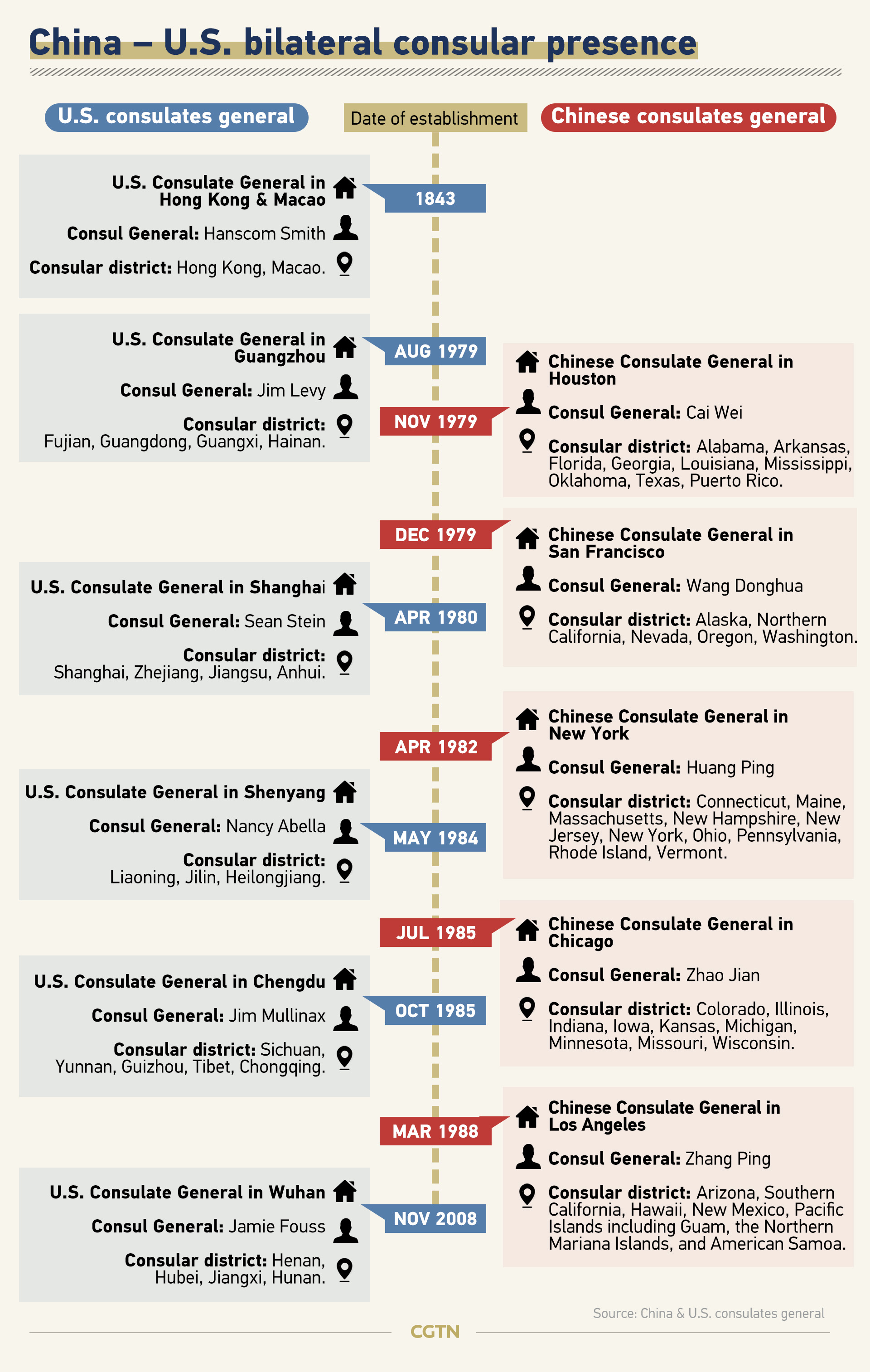
The Chinese Consulate General in New York also reiterated that China urges the U.S. to immediately withdraw its erroneous decision, otherwise China will make legitimate and necessary reactions.
In a statement released on Saturday, a spokesperson from the consulate in New York said China is committed to the principle of non-interference in other countries' domestic affairs, adding that infiltration and interference are never in genes and tradition of China's foreign policy.
Chinese diplomatic missions in the U.S. are dedicated to advancing the two people's mutual understanding and friendship, as well as promoting exchanges and cooperation between the two countries, said the spokesperson.
"People in all sectors in China and in our consular districts help each other in this pandemic, which continues the friendship," the spokesperson noted, calling on the U.S. to hear voices of the mainstream of people while developing China-U.S. relations, instead of being caught by prejudice with political intentions.
Chinese Consulate General in New York will continue to promote local exchanges and cooperation in our consular districts, so as to strengthen the friendship between the two peoples, said the spokesperson.
Check out The China Report, our new weekly newsletter. Subscribe here!
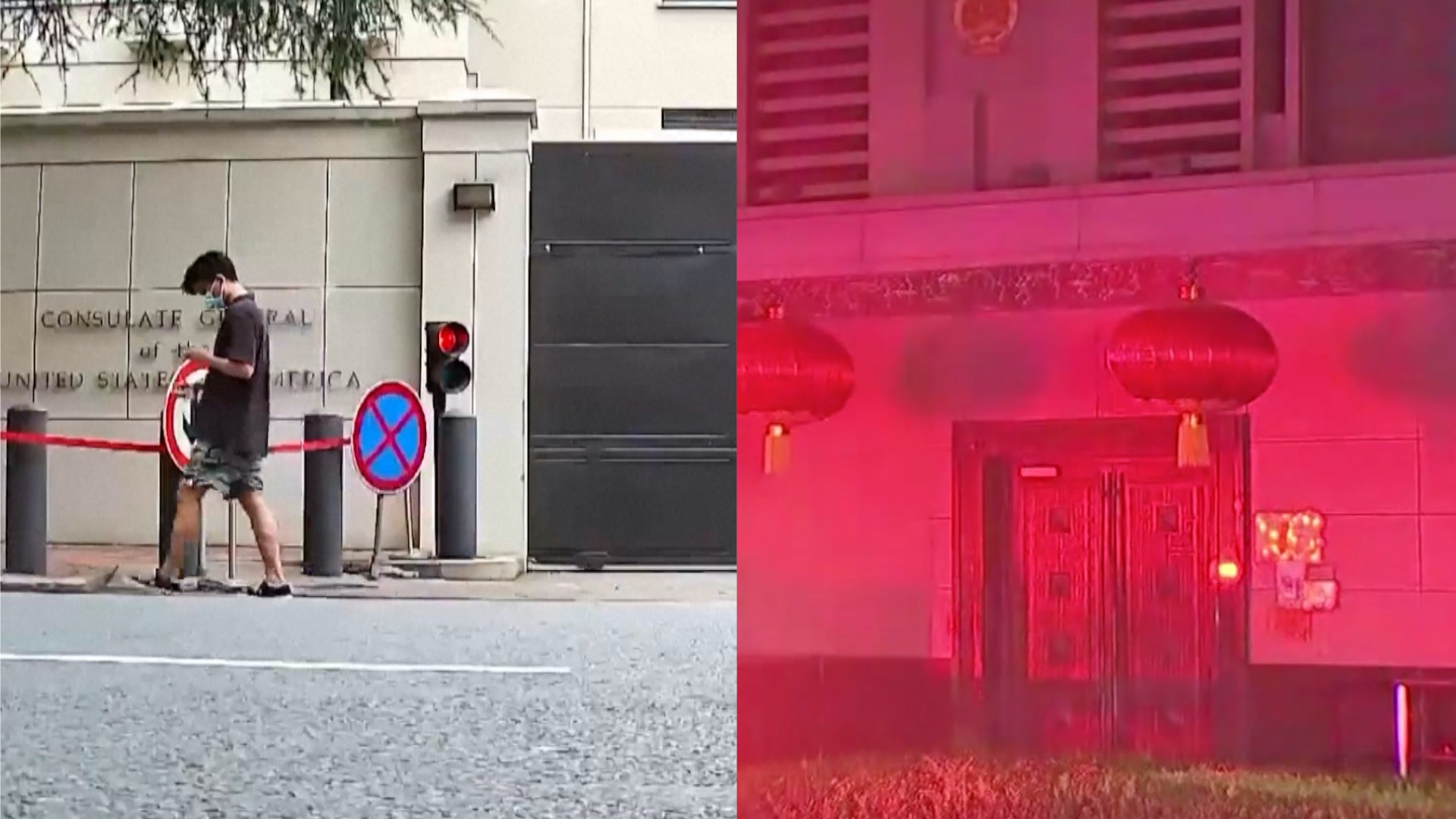
On July 21, the United States launched a unilateral provocation by abruptly demanding that China close its consulate general in Houston, "to protect American intellectual property" and Americans' private information. China then demanded the U.S. close its consulate in Chengdu in retaliation for Houston mission closure.
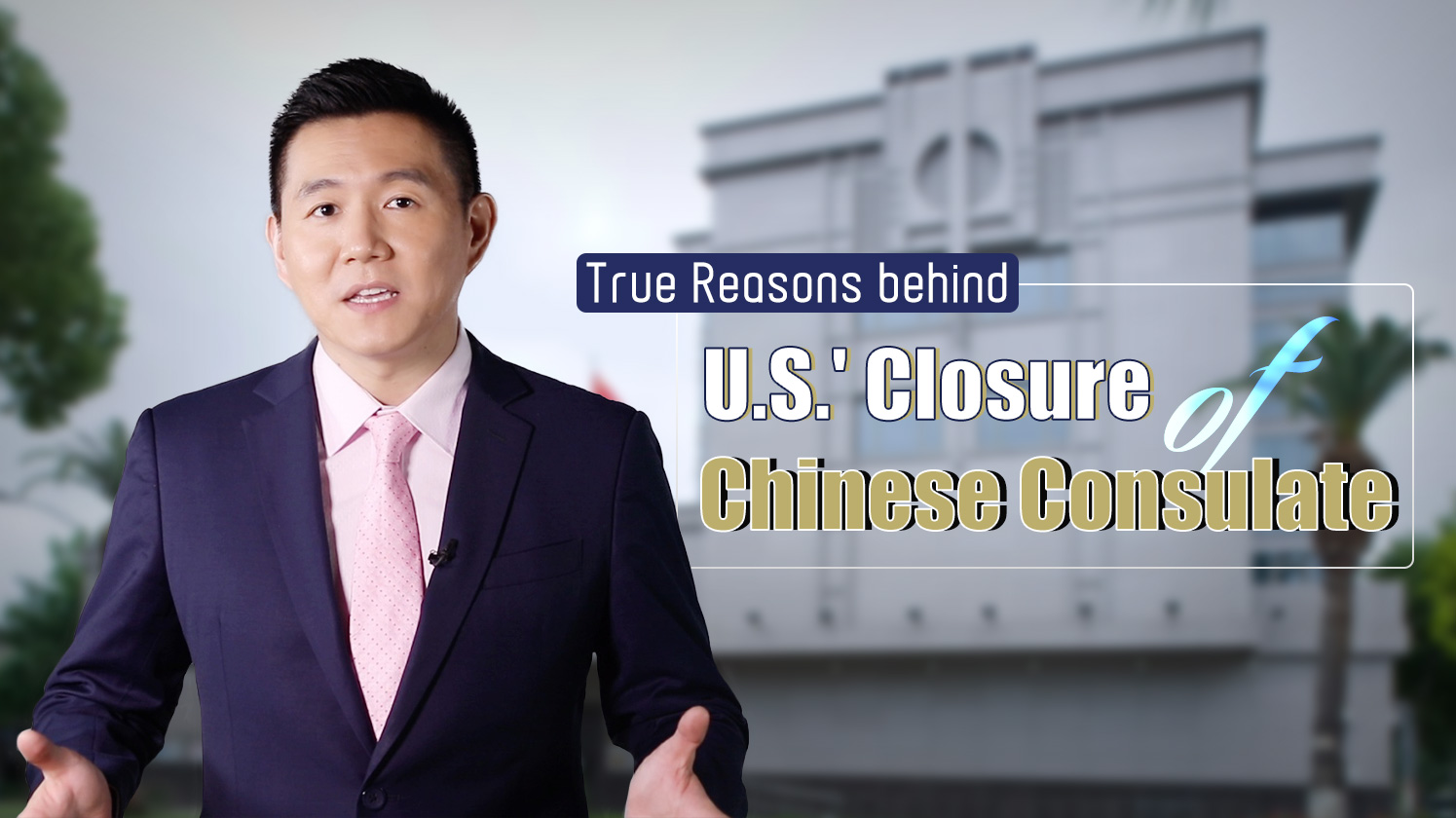
The Trump administration cited national security, economy and jobs, and intellectual property as to why they shut the Chinese consulate in Houston. In this episode of Reality Check with Wang Guan, the CGTN anchor explains why these allegations are just a cover in a well-calculated move by Trump to boost his chances for re-election, as party polls show that China-bashing is immensely popular with his base.

Chinese Foreign Ministry on Friday informed the U.S. Embassy in China of its decision to withdraw its consent for the establishment and operation of the U.S. Consulate General in Chengdu. The ministry also made specific requirements to cease all operations and events by the Consulate General, said a statement issued by the ministry.
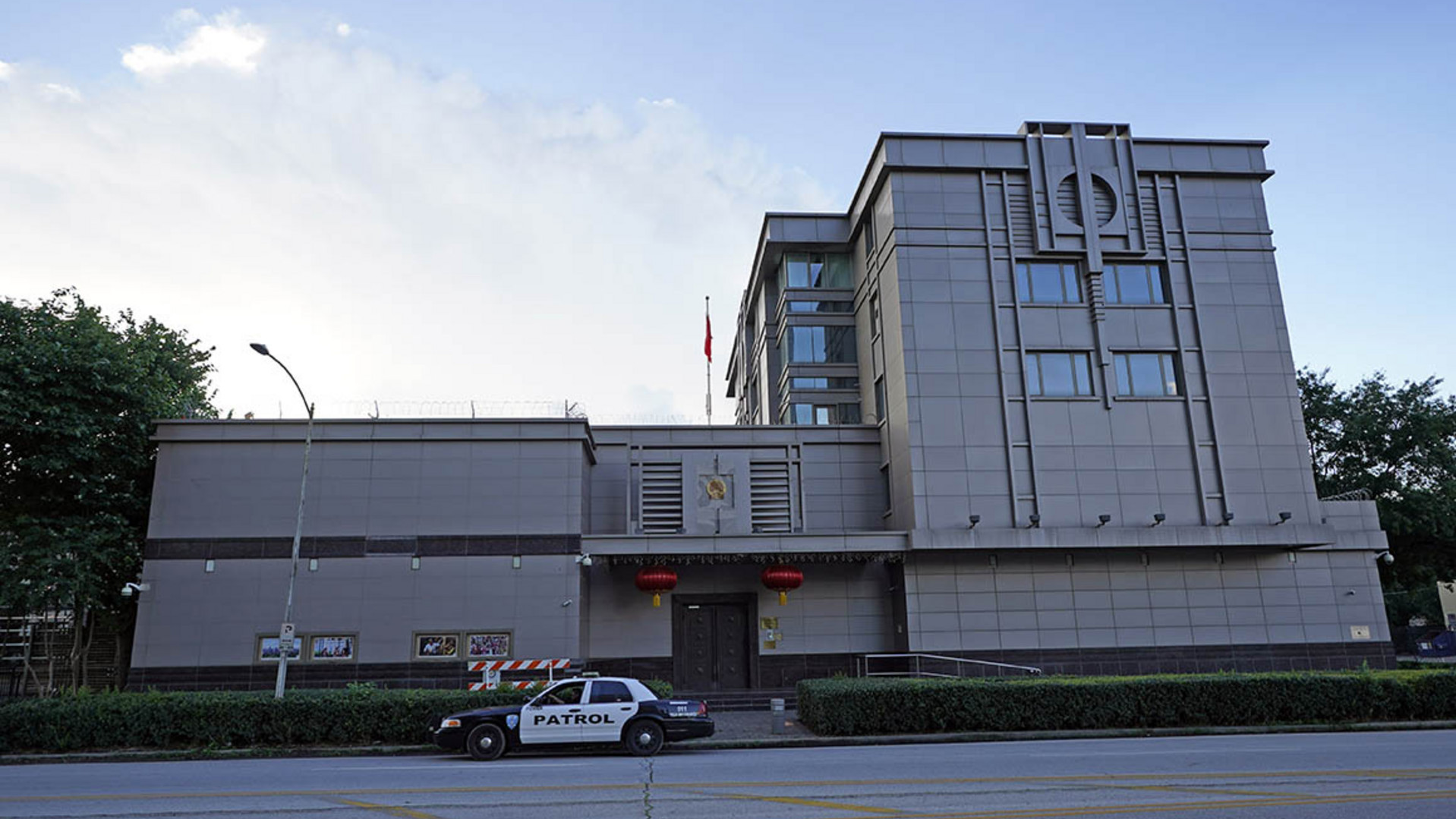
A security guard drives away from the Chinese Consulate-General in Houston, Texas, July 22, 2020 /AP Photo
The U.S.' decision to close the Chinese Consulate-General in Houston has drawn criticism worldwide. Multiple international experts said the move violated international law and norms governing international relations.
On Tuesday, the U.S. side abruptly ordered China to close its consulate in Houston, Texas, within 72 hours.
Hussein Ismail, a researcher at Egypt State Information Service, said that the U.S. move is a unilateral political provocation and a reflection of the U.S. government's arrogance.
Ali Sarwar Naqvi, executive director at the Islamabad-based Center for International Strategic Studies in Pakistan, said the U.S. move is shocking, leaving many unsure of where the U.S. is taking the world.
The decision should be condemned and is a sheer violation of the Vienna Convention, he added.
Andrey Manoilo, a political science professor at Moscow State Lomonosov University, said from a diplomatic point of view, this is a clearly unfriendly act from the U.S.
China strongly condemns U.S. requirement to close Chinese consulate in Houston
Cavince Adhere, an international relations researcher specializing in China-Africa relations in Kenya, said the U.S. move risks escalating the diplomatic friction between China and the U.S. and may further rock bilateral ties.
The closure of the consulate will adversely impact the daily lives of the Chinese living in the U.S. and blunt efforts to promote cultural exchanges among the people of the two countries, Adhere added.
The U.S. is using the "China card" so that President Donald Trump can turn the election situation in his favor, said Volodymyr Volya, an expert at the Ukrainian Institute of Politics. This has already made a negative impact on global economic development, said Volya, warning that further deterioration of China-U.S. relations is possible.
Explainer: What Houston consulate closure means for China-U.S. ties
On Wednesday, the Chinese Embassy in the U.S. strongly condemned the abrupt request, calling it "an outrageous and unjustified move" which will sabotage China-U.S. relations. The statement added that over the years, Chinese diplomatic missions in the United States, including the Consulate-General in Houston, have been performing duties in strict accordance with the Vienna Convention on Diplomatic Relations and the Vienna Convention on Consular Relations, and are dedicated to promoting China-U.S. exchanges and cooperation and advancing the two peoples' mutual understanding and friendship.
Earlier, the U.S. side said the closure of the consulate was meant to "protect American intellectual property," but refused to elaborate on its reasons.
"The U.S. accusations are groundless fabrications, and the excuses it cites are far-fetched and untenable. For the U.S. side, if it is bent on attacking China, it will never be short of excuses," the Chinese Embassy in the U.S. said in a statement.
(With input from Xinhua)
Cai Wei, Consul General of the People's Republic of China in Houston, on Wednesday urged the U.S. to "revoke the erroneous closing decision immediately," noting that otherwise, China will have to respond with legitimate and necessary actions
Cai made the remarks in a joint interview with U.S. media outlets after the U.S. on July 21 abruptly asked China to close its consulate in Houston within 72 hours.
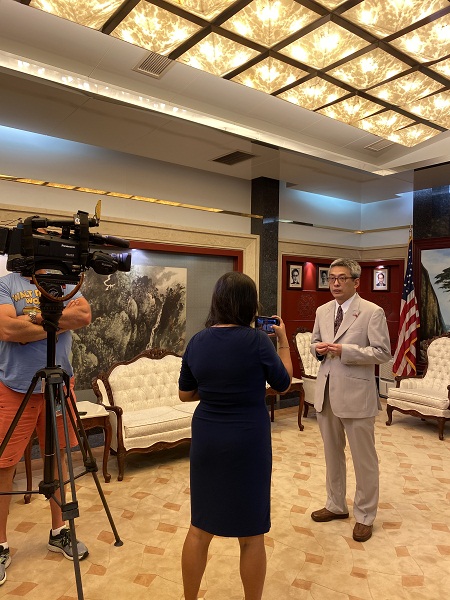
Cai Wei, Consul General of the People's Republic of China in Houston, in a joint interview with U.S. media outlets, July 22, 2020. /Website of Chinese Consulate-General in Houston
"It is a political provocation unilaterally launched by the U.S. side, which seriously violates international law, basic norms governing international relations and the bilateral consular agreement between China and the U.S.," Cai said.
The Chinese diplomat stressed that the past 40 years of interactions between China and U.S. have clearly shown that both sides stand to gain from cooperation and lose from confrontation. He urged the U.S. side to work in the same direction with China to advance bilateral relations based on coordination, cooperation and stability.
Noting State Councilor and Foreign Minister Wang Yi's remarks at the China-U.S. Think Tanks Media Forum recently, Cai said that China has maintained a highly stable and consistent policy toward the U.S. and is willing to grow bilateral relations with goodwill and sincerity.
He also refuted numerous lies about the consulate-general from the U.S. side, saying that repeating a lie a thousand times doesn't make it truth.
"Some U.S. politicians lied for the so-called 'political correctness,' while ignoring people's lives and well-being. In the end, they will harm others as well as themselves. We advise those U.S. politicians to stop playing their tricks as soon as possible," Cai stressed.
The Chinese Foreign Ministry also condemned the U.S.' move the same day and urged it to recall its wrong decision or there will be countermeasures.
On Thursday, the Chinese ambassy in the U.S. strongly refuted the U.S.' accusation, stating that if the U.S. is bent on attacking China, it will never be short of excuses.
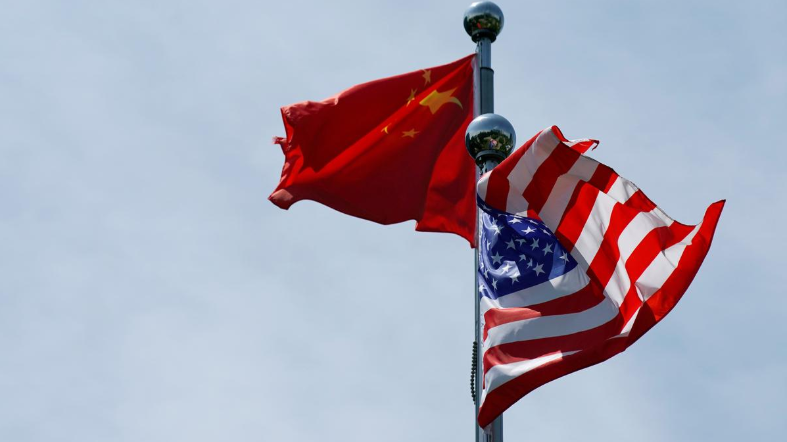
Chinese and U.S. flags. /Reuters
The Visa Office of the Chinese Embassy to the U.S. reported receiving a bomb threat from an unidentified number on Monday, Chinese media the Paper reported.
According to the Paper, the caller dialed the office's telephone number several times and hung up immediately after an official picked up.
In the final phone call, the caller, purportedly male, asked whether he had reached the "Chinese Embassy Visa Office?" When an officer on duty replied affirmatively, he went on to say "Do you know what's in your lobby?" before mimicking the sound of an explosion and hanging up.
At an earlier Chinese Foreign Ministry's press conference on Wednesday, spokesperson Wang Wenbin also mentioned repeated bomb and death threats the Chinese embassy and consulates in the U.S. have received recently.
Read more:
China strongly condemns U.S. requirement to close Chinese consulate in Houston
Chinese Embassy to the U.S. received a death threat mail on March 21 this year, the Paper reported quoting source familiar with this matter.
The number of insulting mails received by the embassy also surged recently, said the source, adding the Chinese embassy and consulates in the U.S. have reinforced its security measures accordingly.
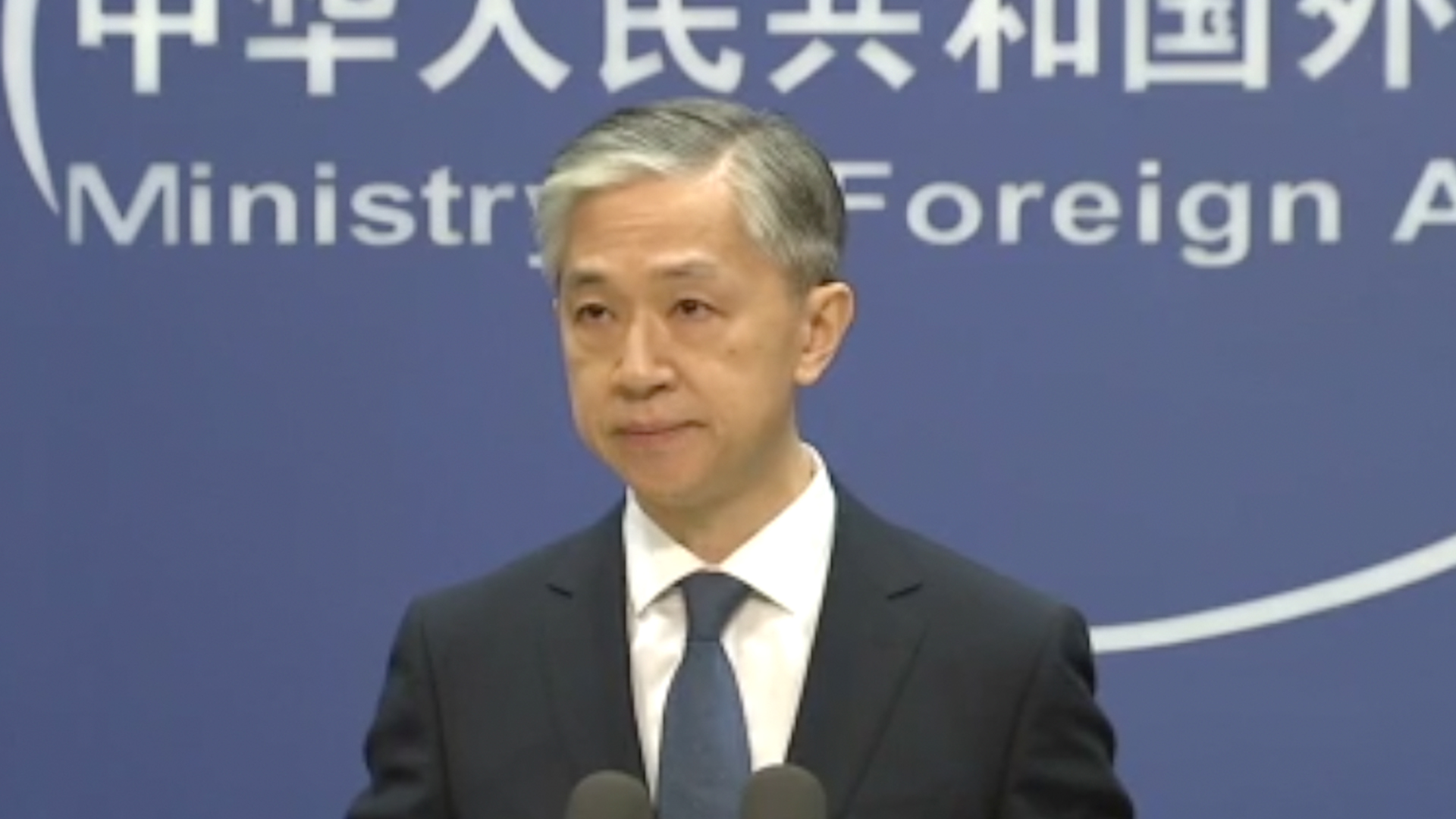
China strongly condemns the U.S. for asking China to close its Consulate General in Houston, Texas, urging it to recall its wrong decision or there will be countermeasures, said the Chinese Foreign Ministry on Wednesday.
The U.S. abruptly asked China to close its Consulate General in Houston in 72 hours starting July 21. The move, according to U.S. State Department was to "protect Americans' intellectual property and private information."
In response, China said the decision is a political provocation made by the U.S., which has seriously violated international law, basic norms of international relations as well as relevant provisions of the China-U.S. Consular Treaty, said Chinese Foreign Ministry spokesperson Wang Wenbin.
The unilateral announcement on closing China's Consulate-General in Houston, according to Wang, is an upgraded action that escalates tensions between China and the U.S. to an unprecedented level.
According to Wang, the U.S. government has long blamed China and smeared it by taking unprovoked attack against the country's social system and by targeting, intimidating and even arresting Chinese students in the United States.
Wang also refuted the U.S. claim of unequal relations between the two countries and the so-called China's infiltration into the U.S., pointing out that it is the United States that has repeatedly set restrictions against Chinese diplomats, opened diplomatic bags from China without permission and seized China's articles intended for official use.
China's Consulate Generals have already received several death threats and even bombs, the spokesperson added.
China has always adhered to its policy of non-intervention; infiltration or interference has never been the norm for China's diplomacy, stressed Wang.
China's diplomatic presence in the U.S. has always been committed to improving mutual understanding and friendship between the two peoples, Wang reiterated, and once again urged the United States to recall its wrong decision.
On Wednesday, the Chinese Foreign Ministry also warned its citizens studying in the U.S. to "be on guard" for arbitrary interrogations and detention.
"Recently, U.S. law enforcement agencies have stepped up arbitrary interrogations, harassment, confiscation of personal belongings and detention targeting Chinese international students in the US," said the foreign ministry in a statement.

Copyright © 2020 CGTN. Beijing ICP prepared NO.16065310-3
Copyright © 2020 CGTN. Beijing ICP prepared NO.16065310-3
Copyright © 2020 CGTN. Beijing ICP prepared NO.16065310-3